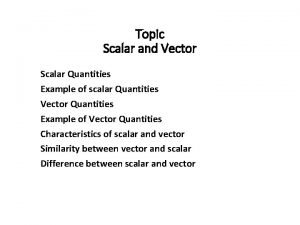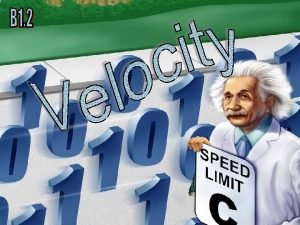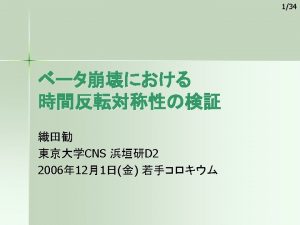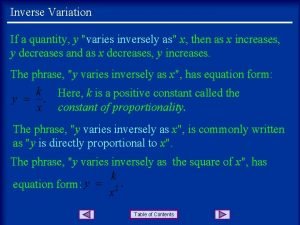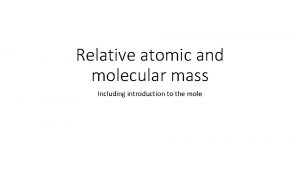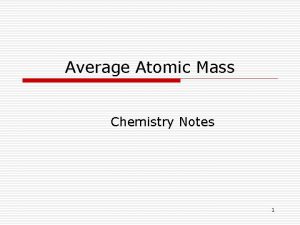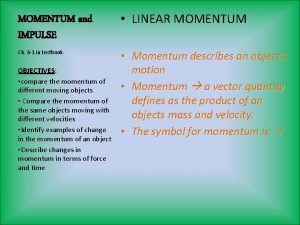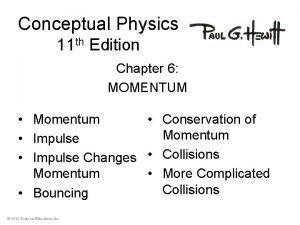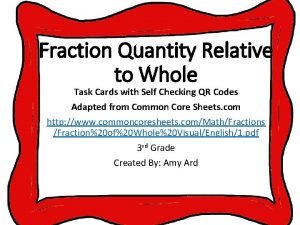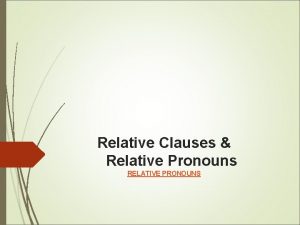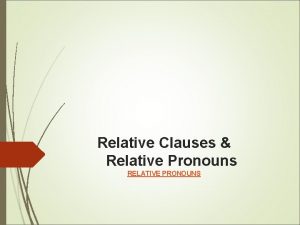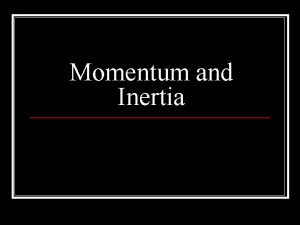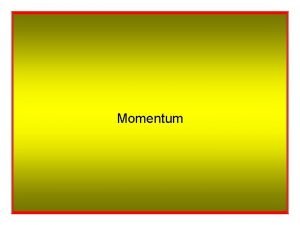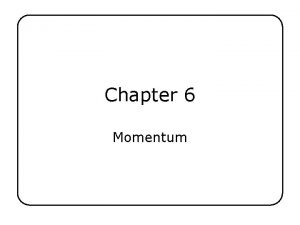Momentum and Mass Is Mass a Relative Quantity










- Slides: 10

Momentum and Mass Is Mass a Relative Quantity? ? ? By Connie Wong

Momentum Classical momentum: p = mo v For speeds much less than the speed of light Relativistic momentum: p = mov/ (√ 1 - v 2/c 2) For speeds closer to the speed of light

Mass p = mov/ (√ 1 - v 2/c 2) The equation of relativistic momentum suggests a relativistic interpretation of mass Mass is Relative!

Mass Increase Formula The mass of an object is measured to increase as its speed increases: m = mo/ (√ 1 - v 2/c 2) mo = the rest mass of the object, the mass it has as measured in a reference frame in which it is at rest m = the relativistic mass, the mass it will be measured to have in a reference frame in which it moves at speed v

Whiteboards: 1. Calculate the mass of an electron when it has a speed of a) 4. 00 E 7 m/s in the CRT of a TV set, and b) 0. 98 c in an accelerator used for cancer therapy. mo of an electron: 9. 11 E-31 kg m = mo/ (√ 1 - v 2/c 2)

1. Calculate the mass of an electron when it has a speed of a) 4. 00 E 7 m/s in the CRT of a TV set, and b) 0. 98 c in an accelerator used for cancer therapy. a) v = 4. 00 E 7 m/s, mo = 9. 11 E-31 kg, c = 3. 00 E 8 m/s b) m = mo / (√ 1 - v 2/c 2) 1. m = 9. 11 E-31 / (√ 1 - (4. 00 E 7)2/ (3. 00 E 8)2 2. m = 9. 19 E-31 kg 3. b) v = 0. 98 c, mo = 9. 11 E-31 kg, c = 3. 00 E 8 m/s 4. m = mo/ (√ 1 - (0. 98 c)2/ c 2) 5. m = 5. 0 mo = Five times its rest mass! 6. m = 4. 56 E-30 kg

More Whiteboards: 2. What is the mass of a proton traveling at v = 0. 75 c? Rest mass of proton= 1. 673 E-27 kg m = mo/ (√ 1 - v 2/c 2) m = 1. 673 E-27/ (√ 1 - (0. 75 c)2/c 2) m = 2. 53 E-27 kg

3. At what speed v will the mass of an object be 15 percent greater than its rest mass? m = mo/ (√ 1 - v 2/c 2) v=? 1. 15 mo = mo/ (√ 1 - v 2/c 2) 1. 15 mo* (√ 1 - v 2/c 2)= mo. . . mo cancels. . . √ 1 - v 2/c 2 = 1/1. 15. . . solve for v. . . v = 1. 48 E 8 m/s or 0. 494 c

The Ultimate Speed m = mo/ (√ 1 - v 2/c 2) As v increases, the mass of the object becomes larger and larger. If v = c, the denominator would equal zero and mass would be infinite. To accelerate an object up to v = c would require infinite energy, which is impossible. Thus: the speed of an object cannot equal or exceed the speed of light.

The End
 Example of scalar
Example of scalar Scalar and vector
Scalar and vector Does a scalar have magnitude
Does a scalar have magnitude Scalar quantity
Scalar quantity Vary inversely
Vary inversely Is atomic mass and relative atomic mass the same
Is atomic mass and relative atomic mass the same How to calculate abundance in isotopes
How to calculate abundance in isotopes Momentum is a vector quantity
Momentum is a vector quantity A 2250 kg car traveling to the west slows down
A 2250 kg car traveling to the west slows down Chapter 6 momentum changing momentum
Chapter 6 momentum changing momentum Common core sheets.com
Common core sheets.com
